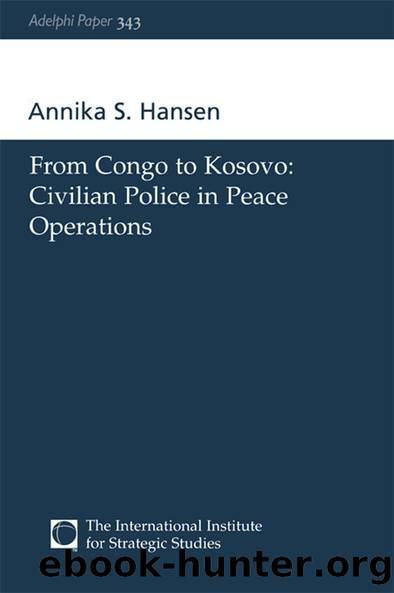From Congo to Kosovo by Annika S Hansen

Author:Annika S Hansen [Hansen, Annika S]
Language: eng
Format: epub
Tags: History, Military, General, Strategy, Political Science, International Relations, Arms Control, Political Freedom
ISBN: 9781136050640
Google: S1mvolrKuogC
Publisher: Routledge
Published: 2013-06-17T03:36:05+00:00
Chapter 3
Dealing with Crime and Political Recalcitrance
The context in which international police must fulfil their mandate is critically important but is often neglected. Time and again, action plans are drawn up without detailed knowledge of the context of their implementation. And invariably, damning criticism of civilian police is made without consideration of the circumstances of their deployment. The most important aspects of the mission area that shape the context for civilian police deployment are the level of crime and instability and the degree of cooperativeness of political authorities and other power holders. The situation in Haiti in 2001 is an example of how the progress achieved through extended police assistance is nullified by a continued political stalemate. These destructive influences must be marginalised in order for civpol operations to ultimately be successful.
Clearly, crime and criminal networks constitute a policing problem for both the international and the local civilian police. In turn, crime is closely tied to the political context, as political leaders are often involved in criminal networks and vice versa. Therefore, the third section of this chapter points to the need to strengthen local police capacity to address the challenges of crime and corruption and to build popular confidence in a system of law and order that is democratically accountable.
People and Politics â Local Support for Civilian Police
The influence of external efforts to enhance public security in war-torn societies pales in comparison to the local circumstances in which the international mission is deployed. Political and popular support are essential for creating a self-sustaining system of law and order, elements of which are considered below. There is the traditional concept of consent that applies to civilian police as much as to peacekeepers. There are legal questions on the right to intervene and on the applicable criminal code. There is the need to manage popular expectations. And, most importantly, there is the difficulty of identifying whom best to work with and of balancing the interests of local counterparts against those of the international civilian police mission. For instance, it is far from certain that political leaders that have used local police forces to consolidate their power in the past will find it easy to work with an independent police force and judiciary, or that corrupt police officers are willing to curb their own power and income by submitting to performance reviews. These are examples of the interests of local counterparts that international civilian police have to be aware of when attempting to reform, monitor or train local police forces.
The Political Context of Civilian Police Missions
It is important to grasp just how momentous the development towards more intrusive missions has been. After all, meddling with the indigenous police goes to the heart of a stateâs sovereignty and its monopoly on coercive means. In order to minimise concerns about external actors challenging local sovereignty, the organisations that deploy civilian police have been careful to establish a sound legal basis for each intervention. A Memorandum of Understanding (MoU), a binding document that outlines rights
Download
This site does not store any files on its server. We only index and link to content provided by other sites. Please contact the content providers to delete copyright contents if any and email us, we'll remove relevant links or contents immediately.
Chaco's Northern Prodigies : Salmon, Aztec, and the Ascendancy of the Middle San Juan Region after AD 1100 by Paul F. Reed(376)
Digital International Relations by Unknown(371)
Law Enforcement Interpersonal Communication and Conflict Management by Brian Douglas Fitch(364)
Skilled interpersonal communication: Research, theory and practice, Fifth edition by Owen Hargie(355)
The Enduring Color Line in U.S. Athletics by Krystal Beamon Chris M. Messer(351)
Critical Perspectives on Human Security : Rethinking Emancipation and Power in International Relations by David Chandler; Nik Hynek(340)
EPSO CAST Political affairs EU policies: How to succeed in the selection procedure by Franco Reverte José María(325)
Evidence-Based Policy Making in Labor Economics by Hamermesh Daniel S.;Nottmeyer Olga K.;Nottmeyer Olga;King Sarah;King Sarah;King Sarah;(317)
Writing Public Policy - A Practical Guide to Communicating in the Policy Making Process by Catherine F. Smith(297)
Criminological Theory in Context by John Martyn Chamberlain(291)
Rothschild and Early Jewish Colonization in Palestine (Geographical Perspectives on the Human Past) by Ran Aaronsohn(289)
Positive Psychology and Spirituality in Counselling and Psychotherapy (Conflict, Ethics, and Spirituality, 12) by unknow(283)
Tibeton Yoga Its Secret Doc by Evans-Wentz(282)
Threshold Concepts in Women's and Gender Studies by Christie Launius Holly Hassel(277)
Social Problems, Social Issues, Social Science by James Wright(274)
Cognitive Development in Infancy and Childhood (Elements in Child Development) by Mary Gauvain(272)
Play in child development and psychotherapy: toward empirically supported practice by Sandra W. Russ(271)
Latin American Politics and Society by Gerardo L. Munck & Juan Pablo Luna(251)
What Makes a Social Crisis?: The Societalization of Social Problems by Jeffrey C. Alexander(232)
